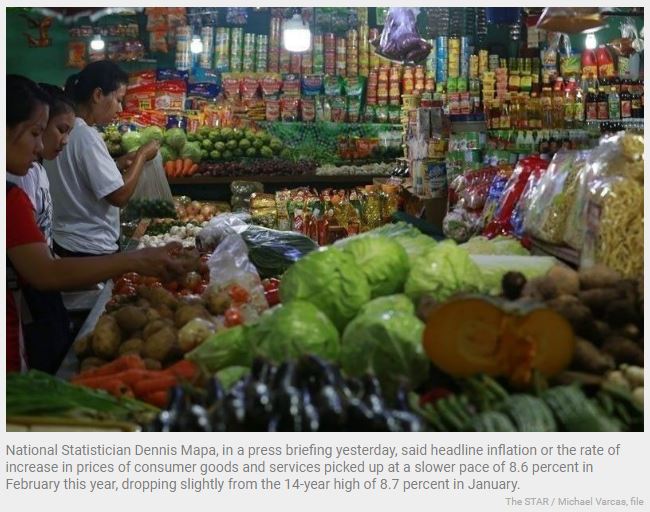Philippines: Inflation eases to 8.6% in February
MANILA, Philippines — Inflation in the Philippines eased slightly in February from the previous month due to the slower increase in transport prices, according to the Philippine Statistics Authority (PSA).
National Statistician Dennis Mapa, in a press briefing yesterday, said headline inflation or the rate of increase in prices of consumer goods and services picked up at a slower pace of 8.6 percent in February this year, dropping slightly from the 14-year high of 8.7 percent in January.
This is the first time that the headline inflation rate eased after being on an uptrend since August last year.
The February inflation print is within the 8.5 to 9.3 percent forecast of the Bangko Sentral ng Pilipinas (BSP).
The latest reading, however, was faster compared to the three percent in February last year.
“The reason for the slower inflation rate this February than January is the slower movement in transport prices,” Mapa said.
Of the 13 commodity groups being tracked by the PSA, he said transport was the sole driver of the downtrend in the overall inflation, registering a nine percent inflation rate in February from 11.1 percent in January due to slower increases in gasoline, diesel and motorcycle prices.
On the other hand, nine commodity groups registered faster increases in February this year, including food and non-alcoholic beverages, which rose slightly to 10.8 percent from January’s 10.7 percent.
Inflation for food alone, however, slowed down slightly to 11.1 percent in February this year from 11.2 percent in January, mainly due to lower growth in vegetables, tubers, plantains, cooking bananas and pulses.
Slower growth rates were also seen in the following food groups in February this year: rice, corn, meat, oils and fats as well as sugar, confectionery and desserts.
Other commodity groups that had faster upticks in February were alcoholic beverages and tobacco; clothing and footwear; furnishings, household equipment and routine household maintenance; health; information and communication; recreation, sport and culture; restaurants and accommodation services; and personal care, and miscellaneous goods and services.
Average inflation for the January to February period was at 8.6 percent.
While headline inflation eased slightly, core inflation, which excludes volatile items like food and fuel, rose to 7.8 percent in February from 7.4 percent in January, and 1.9 percent in February last year.
Given the latest data, Rizal Commercial Banking Corp. chief economist Michael Ricafort said “there is a chance that year-on-year inflation could have already topped out/reached the peak in the first quarter of 2023.”
He said inflation could even ease significantly this month into the second half of 2023 due to higher base or denominator effects and lower global crude oil prices.
Oxford Economics assistant economist Makoto Tsuchiya said the country’s inflation rate is expected to continue trending down this month.
“Easing supply-side pressures will help tame inflation, while demand-pull inflationary pressures are unlikely to make material contributions amid fading pent-up demand boost from domestic reopening and softer global outlook,” he said.
He said there are still upside risks, however, as prices remain volatile and further supply-side bottlenecks could make inflation stickier than expected.
“Also, the magnitude of the US Fed tightening and how much the BSP will keep up will have ramification for the peso, as weaker currency will drive up import prices,” he said.
To alleviate the impact of higher commodity prices, particularly to the poor, National Economic and Development Authority Secretary Arsenio Balisacan said there is a need to recalibrate government strategies.
“We must rethink our strategies to combat rising food prices. The country’s current high inflation is largely driven by domestic, supply-side constraints. Agricultural imports were ill-timed and food supplies have been inadequate. The solution is to get to the root of the problem, including fixing the bottlenecks along all segments of the agricultural value chain,” he said.
He said a high-level inter-agency committee that would advise the President and the cabinet on measures to keep food prices stable and ensure food security should be created, as food items account for the bulk of expenditures of the poor.
“We must immediately address this issue if we are to remain on track to meeting our poverty reduction targets for the medium term,” he said.
Source: https://www.philstar.com/business/2023/03/08/2249983/inflation-eases-86-february


 Thailand
Thailand




